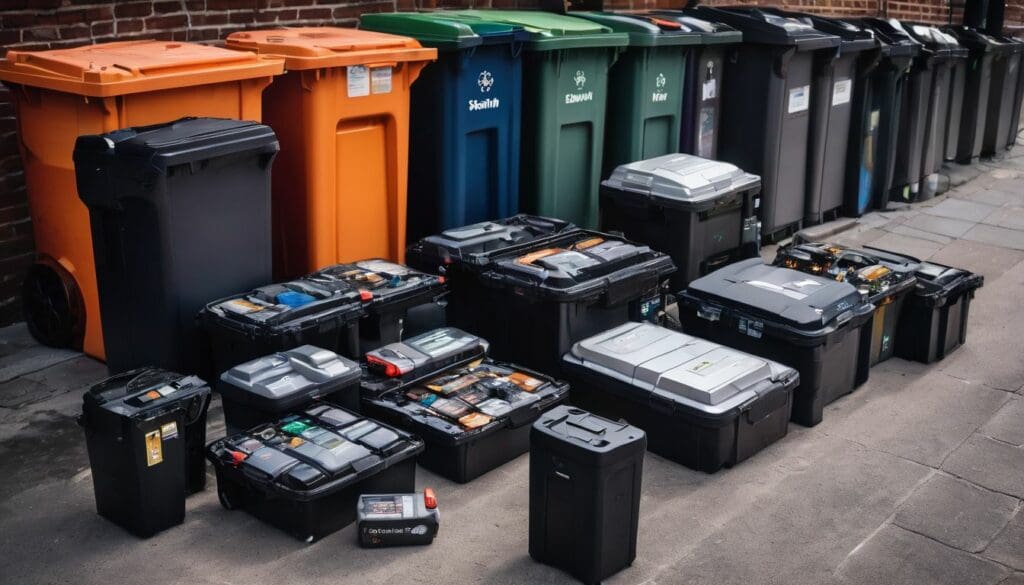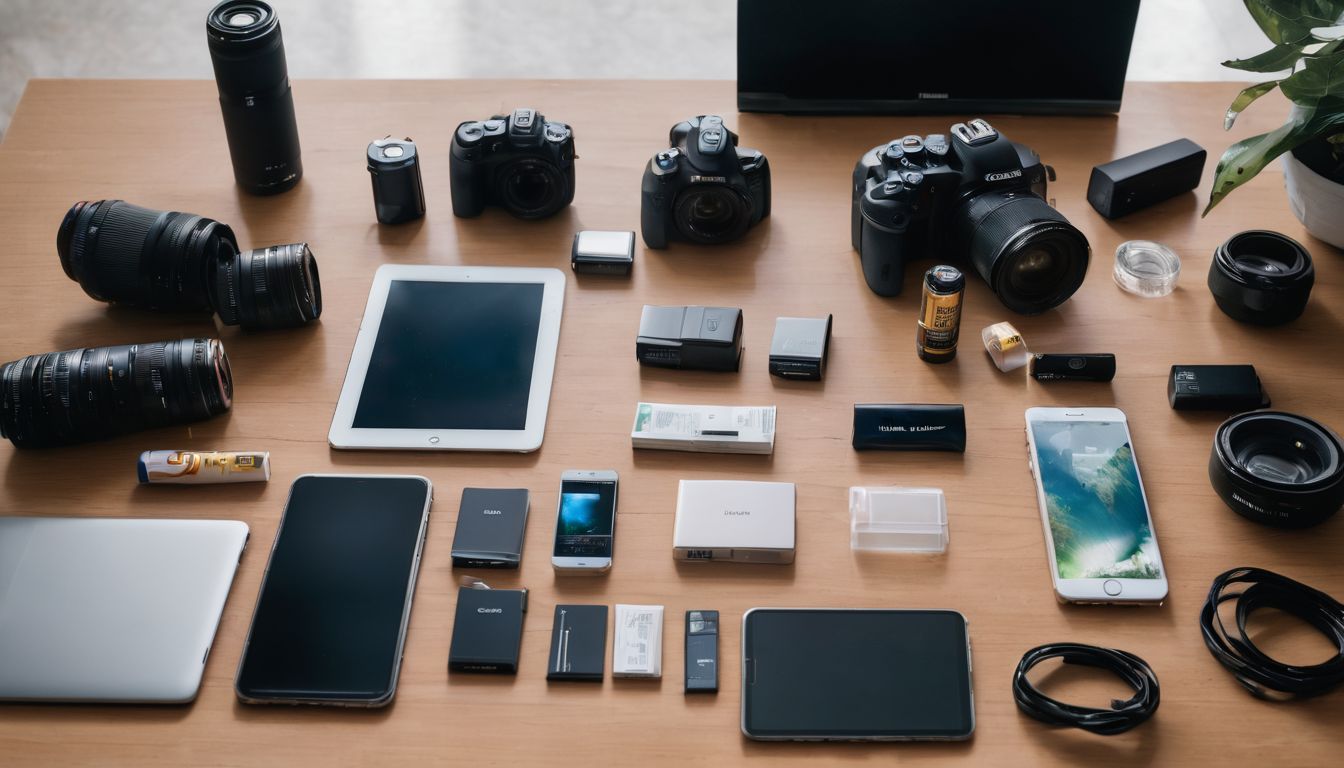We’ve all been there, standing before that drawer or cupboard brimming with once-loved gadgets, an assortment of spent batteries and sundry items that we no longer have a use for. It’s the classic household conundrum – how do you part ways with these bits and bobs in a manner that won’t weigh heavily on your conscience or our precious Earth? Like so many of us who hold environmental concerns close to our hearts, finding the right way to say goodbye to obsolete tech isn’t always straightforward.
With a staggering 50 million tonnes of electronic waste generated worldwide every year, our practical guide is here to steer you through conscientious disposal and recycling choices for various consumer products.
Together we can take meaningful steps towards change; read on for easy-to-follow solutions!
Key Takeaways
- Recycling old electronics, batteries, plastics, glass, and metals is essential to reduce waste and prevent harmful chemicals from damaging the environment. Look for local e-waste collection points or recycling facilities that can handle these items.
- Donating functional consumer products like clothing and home goods extends their lifespan, supports the community, and lessens environmental impact. Find charities or organisations in your area that accept such donations.
- Certified product destruction ensures secure disposal of sensitive electronic devices while adhering to environmental regulations. Use certified services to protect personal data and prevent e-waste from entering landfills.
- Properly disposing of common recyclables through designated bins or facilities helps to conserve natural resources and energy while reducing greenhouse gas emissions associated with new production.
- Engage in responsible disposal practices like using up cleaning products completely or taking them to hazardous waste sites rather than throwing them away carelessly. This prevents potential health risks caused by toxic substances leaching into soil and water sources.
The Importance of Responsible Consumer Product Disposal
Moving beyond the basics of recognising waste, let’s delve into why responsible consumer product disposal stands as a crucial step towards environmental stewardship. Throwing away old gadgets, plastics or batteries in the regular trash can cause harmful chemicals to leach into our soil and waterways.
This recklessness not only contaminates our natural resources but also endangers wildlife and disrupts ecosystems.
Every item we dispose of properly is a triumph for eco-friendly disposal practices and sustains the circular economy. It’s vital that every cellphone, tablet, or laptop we no longer need gets directed to secure recycling facilities or certified product destruction services.
Our commitment to sustainable consumer product disposal ensures toxic materials are handled with care, keeping them out of landfills where they can do untold damage for generations.
https://www.youtube.com/watch?v=QvKRj1w1zmg
Types of Consumer Products and their Disposal Options
From old electronics to batteries and plastics, there are various consumer products that need responsible disposal options. Knowing how to properly dispose of these items can make a significant impact on reducing waste and protecting the environment.
Electronics
When disposing of old electronics, it is important to consider recycling options to reduce electronic waste. Many local authorities and retailers offer free disposal services for items such as tablets, laptops, and mobile phones.
When considering this option, ensure that the service provider follows ethical e-waste management practices by verifying their certifications.
Responsible e-waste management involves sustainable disposal methods that contribute to reducing environmental impact. By recycling electronic products, we can extend their lifecycle and prevent hazardous materials from entering landfills.
Batteries
When it comes to environmentally friendly disposal options, recycling batteries is crucial. Proper battery recycling helps prevent toxic chemicals and heavy metals from seeping into the environment, supporting eco-friendly waste management.
By responsibly disposing of batteries, we can reduce the impact on landfills and protect our surroundings.
Battery and cellphone recycling are essential aspects of responsible e-waste management. Recycling hard-to-manage items like batteries ensures that they do not end up in regular trash bins, where they can harm the environment.
Plastics
When it comes to responsible disposal of consumer products, plastics present a unique challenge due to their prevalence in everyday items. Many plastic products can be recycled, such as plastic bottles and containers made from PET or HDPE.
It is crucial to check local recycling guidelines for specific instructions on what types of plastics are accepted for recycling. Additionally, reducing the use of single-use plastics and opting for reusable alternatives can significantly decrease the environmental impact of plastic waste.
Plastic items like food packaging, toys, and household goods often end up in landfills if not properly managed. However, exploring alternative options such as upcycling or reusing plastic materials before discarding them can help minimise the environmental impact associated with plastics.
Glass
Glass is a common household item that can be recycled to minimise its environmental impact. By recycling glass bottles and jars, we can help reduce the amount of waste sent to landfills and conserve natural resources.
When glass is recycled, it can be melted down to make new products, saving energy and reducing greenhouse gas emissions. Recycling glass also prevents the need for new raw materials, making it an eco-friendly choice for responsible consumer product disposal.
To properly recycle glass items, simply separate them from other recyclables and place them in designated recycling bins or take them to a nearby recycling centre. Glass containers should be rinsed before recycling to remove any residue that could contaminate the recycling process.
With proper handling and disposal of glass products, we can contribute to a more sustainable environment.
Metal
Metal products, such as cans and foil, should be recycled to minimise environmental impact. Recycling metal conserves natural resources and reduces greenhouse gas emissions, making it an eco-friendly disposal option.
By recycling metal products like aluminium and steel, we can contribute to a more sustainable environment while reducing the demand for new raw materials.
Recycling metals also helps in lowering energy consumption and lessening pollution levels associated with mining and extraction processes. It’s important to separate metal waste from other trash so that it can be properly processed at recycling facilities.
Taking the extra step to recycle our metal consumer products ensures that they are reused in an environmentally responsible manner rather than ending up in landfills or incinerators.
Miscellaneous items
When it comes to responsibly disposing of miscellaneous items such as cleaning products, home goods, and clothing, there are several options available. Donating gently used clothing or home goods can help extend the lifespan of these items while reducing waste.
For cleaning products, ensure to use them up completely or look for hazardous waste disposal sites in your area that accept these types of products. Responsible disposal methods for miscellaneous items play a crucial role in reducing environmental impact and promoting eco-friendly practices.
Properly managing the disposal of miscellaneous consumer products is vital for protecting the environment and minimising health hazards. By recycling common household items and donating usable goods, individuals can contribute to reducing waste and promoting ethical product lifecycle management.
Why Recycling and Proper Disposal Matters
Recycling and proper disposal matters because it helps to reduce waste, protect the environment, and minimise health hazards for ourselves and future generations. To learn more about responsible consumer product disposal, keep reading!
Reducing waste
Reducing waste is vital for protecting the environment and conserving natural resources. By recycling common recyclables such as plastics, glass, and metal, we can significantly decrease the amount of waste sent to landfill.
Additionally, participating in electronics recycling and battery and mobile phone recycling helps minimise ewaste, reducing environmental impact. Responsible disposal methods not only reduce waste but also contribute to a healthier planet while promoting ethical consumerism.
Properly disposing of old consumer products plays a crucial role in environmentally-friendly product disposal. Recycling hard-to-manage items like electronics or household goods ensures that they are handled responsibly, contributing to sustainable living practices.
Protecting the environment
After reducing waste, protecting the environment is the next crucial step in responsible consumer product disposal. By recycling common recyclables such as plastics, glass, and metals, we can reduce the strain on natural resources and minimise pollution.
Ethically disposing of electronic waste through proper channels also safeguards wildlife and ecosystems from harmful chemicals and heavy metals.
Engaging in environmentally-friendly product disposal practices not only contributes to a healthier planet but also sets an example for others to follow. Every small effort counts towards creating a sustainable future for generations to come.
Minimising health hazards
By responsibly disposing of old consumer products, we safeguard our health and well-being. When electronics and batteries are not properly recycled or disposed of, they can release toxic chemicals like lead, mercury, and cadmium into the environment.
These substances pose serious health risks to both humans and wildlife when they leach into soil and water sources. Proper disposal methods such as recycling or certified product destruction help prevent these hazardous materials from contaminating the environment and compromising public health.
Reducing exposure to harmful substances is crucial for protecting ourselves and future generations from potential health hazards. Responsible ewaste management also plays a significant role in minimising health risks associated with electronic waste.
Responsible Disposal Methods
When it comes to responsibly disposing of old consumer products, there are a few options to consider. From recycling and donating to certified product destruction and proper disposal methods, each method plays a crucial role in reducing waste and protecting the environment.
Recycling
Recycle common recyclables, such as plastics, glass, and metals by sorting these items and placing them in the appropriate recycling bins. Ensure that electronics are disposed of at designated e-waste collection points to prevent harmful components from entering landfills.
Engage in clothing donation to extend the lifecycle of textiles and reduce waste. When disposing of cleaning products, follow the guidelines for environmentally-friendly product disposal provided by local authorities.
Dispose of home goods responsibly by taking advantage of recycling programs offered by manufacturers or retail stores. Properly recycle hard-to-manage items like tablets and laptops through electronic waste collection centres or certified recyclers.
Donating
When considering the responsible disposal of old consumer products, donating is an excellent option for items that are still in usable condition. By donating your old electronics, home goods, and other consumer products to local charities or community organisations, you can extend the life of these items and reduce waste.
This environmentally friendly practice allows others to benefit from your unwanted goods while promoting a sustainable approach to product disposal.
Donating provides an opportunity to give back to the community and support environmental conservation efforts by reducing the demand for new products. It also contributes to a circular economy where resources are reused rather than discarded, helping to minimise environmental impact.
Certified product destruction
When considering responsible disposal of old consumer products, certified product destruction is a crucial option. Using this method ensures that products are destroyed in a secure and environmentally friendly manner, preventing them from ending up in landfills or causing harm to the environment.
By choosing certified product destruction, consumers can have peace of mind knowing that their unwanted items are being handled responsibly and with the utmost consideration for environmental impact.
Certified product destruction also helps prevent potential misuse or mishandling of old items, especially those containing sensitive information or hazardous materials. This process adheres to strict regulations, guaranteeing that all components are properly disposed of and recycled where possible.
Proper disposal methods
When disposing of old consumer products, recycling is a responsible method to reduce environmental impact. Common recyclables like plastics, glass, and metal can be recycled at designated collection points or through curbside pickup.
For hard-to-manage items such as electronics and batteries, special recycling facilities are available where these products can be properly dismantled and processed for reuse of their components.
Proper disposal methods also include donating still functional items to charities or individuals in need. Additionally, certified product destruction services ensure that sensitive information from electronic devices is securely disposed of.
To responsibly dispose of old consumer products, environmentally conscious individuals should research local recycling options and take advantage of programmes that accept various types of waste.
Conclusion
In conclusion, responsible disposal of old consumer products is crucial for protecting the environment and minimising health hazards. Recycling common recyclables like electronics, batteries, plastics, glass, and metal can help reduce waste and promote eco-friendly practices.
Donating or using certified product destruction are other effective methods for proper disposal of home goods. Embracing environmentally-responsible product recycling not only supports conservation but also encourages a healthier planet for future generations.
FAQs
1. What does responsible product disposal mean?
Responsible product disposal involves getting rid of old consumer goods in an environmentally-friendly manner, ensuring they don’t harm the environment.
2. How can I recycle common recyclables from my home?
You can recycle common recyclables like paper, glass, and plastic by sorting them into your local recycling bins as instructed by your community’s recycling program.
3. What should I do with cleaning products I no longer need?
When disposing of cleaning products, check for any special instructions on the packaging to ensure you’re doing it safely and in an eco-friendly way.
4. Can tablets and laptops be recycled when they are outdated?
Yes, tablets and laptops must be recycled properly through electronic waste programs since they contain materials that are harmful if not handled correctly.
5. Why is it important to focus on environmentally responsible product recycling?
Focusing on environmentally responsible product recycling helps reduce pollution and conserve natural resources, supporting overall environmental responsibility.





